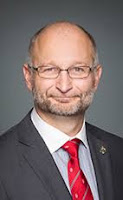Executive Director, Euthanasia Prevention Coalition
"Every day is hell," she said. "I'm so tired. I'm done. I've tried everything. I feel like I've lived my life."Pauli does not currently qualify for MAiD (euthanasia) but in March 2024 Canadians whose sole underlying condition is mental illness, will qualify for euthanasia. Paperny states that Canada will have one of the most expansive euthanasia laws in the world.
Canada's Justice Minister, David Lametti told Paperny that:
"We have gotten where we are through a number of very prudent steps,"
"It's been a slow and careful evolution. And I'm proud of that."Paperny stated that in 2022 there were 15 Québec euthanasia cases that were outside of the law and there were 19 cases in British Columbia since 2018.*
 |
| David Lametti |
Lametti told Paperny that the federal government is considering recommendations from a parliamentary committee to allow euthanasia by advance requests and for "mature minors" - people under 18 deemed capable of making this decision.
When asked about the cases of people with disabilities who are living in poverty, homeless or having difficulty receiving medical treatment Lametti said:
But "you can't get MAID simply because you're having some social challenges or economic challenges. ... Unless they fall into the medical criteria, they can't access."Lametti ignores the fact that people qualify for MAiD (euthanasia) based on their medical condition (disability) but they are not seeking death because of their disability but because of their social, medical and economic challenges.
 |
| Dr Sonu Gaind |
It can be difficult to determine whether a mental illness is truly irremediable, as the law requires, and to differentiate between pathological suicidality and a rational desire to die,
"We don't even understand the biology of most mental illnesses,"
 |
| Michelle Hewitt |
"My biggest fear is that we go to this absolute terminal end and people die but we haven't invested time, money, people in putting the things in place that would mean that people don't want to consider"Hewitt commented on the euthanasia death of Sean Taggert in 2019.
Sean Tagert, with amyotrophic lateral sclerosis (ALS) or Lou Gehrig's disease who opted for medically assisted death in 2019 after he struggled to get 24-hour care.Paperny completed the article by asking Charles Falconer, a British Labour peer who supports euthanasia, how Canada's experience with euthanasia is affecting the debate in Britain, where euthanasia is not legal. Falconer stated:
"He was very clear on what he wanted - more care hours at home - and when he was told he would have to move to a care facility a distance from his family, particularly his young son, he used MAID,"
"Canada is being used primarily as an argument against us, not an argument in favour,"
"It does in one sense [represent a slippery slope], doesn't it, because it started off with terminal illness and it's ended up with non-terminal illness and mental illness."
Canada's has experienced a slippery slope when it comes to euthanasia. Lisa Pauli's wish to die by euthanasia does not bring assurance that euthanasia for mental illness is ever warrented. Her story is an illustration of a woman who needs good medical and mental health treatment and support, not death.
It is natural that in her condition she would feel "tired of living" but the answer is not death by lethal drugs, but supportive and intensive treatment that is life giving, not death giving.
* The data does not tell the whole story. Canada has a self-reporting system. The doctor or nurse practitioner who approves the death is also the same doctor or nurse practitioner that can carry-out the death and the same doctor or nurse practitioner required to report the death. Self-reporting systems protect the doctors and nurse practitioners who are willing to participate in euthanasia.


I wonder if the doctors have tried Ketamine for this beautiful young woman.
ReplyDeleteI have a friend who has suffered from anorexia for 40 years too. She has doctors appointments and see a therapist weekly. Her body is suffering because of the eating disorder. She has pain and is trying to get help and sees doctors. She most importantly has faith in Jesus and is a practicing Catholic. She prays and others pray for her. Faith gives her hope. If someone does not believe in Jesus and has no hope, that is sad and I can’t imagine how they feel. I will pray for this women and those with eating disorders to get medical, emotional and spiritual support. We are created in the image and likeness
ReplyDeleteOf God. God is love. He loved us
So Much he sent his son to die for us so we can live forever. John 3:16
Life is difficult. We were made to
Live in community. I hope this woman
Will find family, Friends, doctors who will love her and support her. God bless her and others suffering from eating disorders.
Tina
God bless all people With eating disorders. II pray they can get the medical, emotions and
ReplyDeleteSpiritual support they need.
Tina
I had an eating disorder for 18 years. I am currently a Mother of seven children and grandmother to soon to be 7 children. God can do anything Miracles can happen. Yes, bulimia was a living hell on earth , but , LIFE IS WORTH LIVING. Praying for this woman who needs to know she is loved and there is HOPE!
ReplyDeleteTina,
ReplyDeleteWhat type of therapy has your friend been getting? I am familiar with a counselling technique that is used for eating disorders. It's also used for a number of different traumas. It's called OEI (Observational & Experiential Integration). If you would like more information, let me know. I have set it up so I'll receive emails of follow up comments. I think that means I'll get any responses to this article, one of which could be an answer from you.